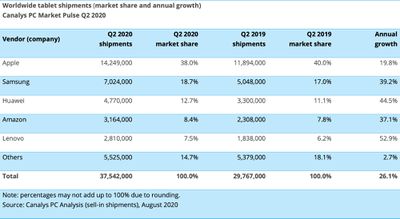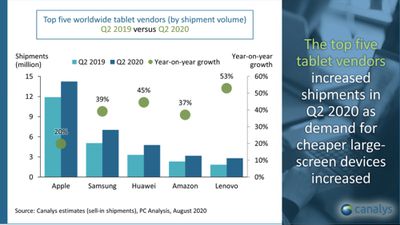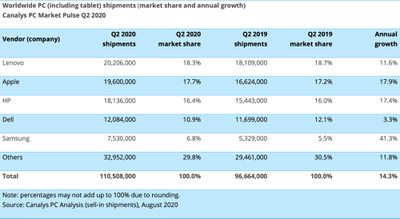Apple shipped an estimated 14.3 million iPads in the second quarter of 2020, maintaining its position as the number one tablet vendor in the world, according to new data shared today by Canalys. That's up 19.8 percent from the 11.9 million sold in the year-ago quarter.

Apple's own earnings for Q2 2020 indicated a major surge in iPad sales as people work and learn from home. Apple does not provide details on the number of iPads sold or a model breakdown, but iPad sales brought in $6.5 billion during the quarter.
Apple has long been the number one tablet vendor in the world, and in Q2 2020, held 38 percent market share. Samsung was the number two tablet vendor worldwide, shipping 7 million tablets, followed by Huawei, Amazon, and Lenovo with 4.7 million, 3.2 million, and 2.8 million tablets shipped, respectively.

The overall worldwide tablet PC market grew by 26 percent in Q2 2020, which Canalys attributes to remote work.
Worldwide tablet shipments hit 37.5 million units in Q2 2020, a remarkable 26% year-on-year increase. Tablets, part of the PC market, had faltered in recent years, but demand in Q2 2020 was boosted by consumers and businesses wanting affordable access to basic computing power and larger screens to facilitate remote work, learning and leisure. Vendors were able to ramp up production to meet this renewed demand. At the same time, retailers and carriers in various markets provided financial incentives on devices and data to encourage tablet purchases.
Canalys also provided data on worldwide PC shipments, with tablet data included. When accounting for combined Mac and iPad sales, Apple shipped 19.6 million devices during the quarter for 17.7 percent market share, trailing after Lenovo with 20.2 million devices shipped and beating out HP and Dell with 18 million and 12 million devices shipped, respectively.

Apple's Mac earnings were also way up, bringing in $7 billon, $1.2 billion more than the $5.8 billion in Macs sold in Q2 2019. During Apple's most recent earnings call, Apple CEO Tim Cook noted that supply constraints affected both Mac and iPad sales during the quarter. Some Macs, such as the iMac, have had long shipment estimates since soon after the pandemic began.
Apple is working to get more iPads and Macs into the hands of customers, so sales are expected to see continued growth in the fourth quarter.























